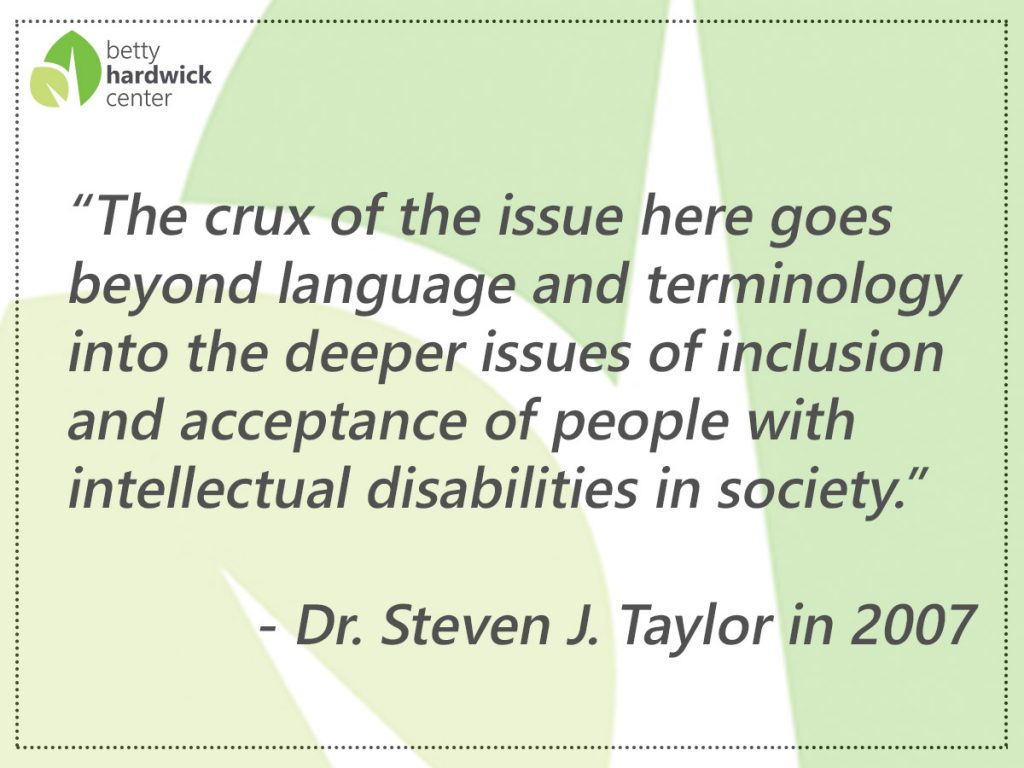What is IDD?
Contact Details
2616 South Clack
Abilene, TX 79606
Phone: (325) 690-5100
24-Hour Crisis Hot Line: (800)758-3344

United Way of Abilene is a proud community partner in making Adaptive Recreation a reality!

What Is IDD? And Why Don’t We Use MHMR Anymore?
Timeline:
2007: AAIDD officially replaced the “Mental Redardation” portion of its name to “Intellectual and Developmental Disabilities”
2009: Among other similar campaigns, the “Spread the Word to End the Word” campaign was established at that year’s Special Olympics World Winter Games
2010: Passage of Rosa’s Law, which removed the phrase “mental retardation” from federal health, education and labor policy and included other “person-first” linguistic shifts
The IDD Shift
While IDD (short for intellectual and developmental disabilities) is an acronym that we encounter every day at Betty Hardwick Center, we realize that the phrase is a relative mystery for most people who don’t have a personal connection to our profession. The term, IDD, began to gain in popularity in 2007 when the then American Association on Mental Retardation officially replaced the “MR” portion of its name with “IDD,” thus becoming the AAIDD and a leader of the broader movement to distance modern discussions of such conditions from the stigma of the “r-word.”
Is there anything inherently wrong with the term “mental retardation?” Those are words, and the words, while imperfect, were in use for decades prior to the IDD shift. The AAIDD was the AAMR for approximately 20 years, after all. Because “retarded” and its derivatives have been and continue to be used as common insults, and without any clinical context, this change made a lot of sense. The change is worth being aware of and embracing.
The late Dr. Steven J. Taylor, who served as editor of AAIDD from 1993-2011, has commented on how stigmatization of “MR” contributed to the name change. Back in 2007, he said that, “intellectual and developmental disabilities is simply less stigmatizing than mental retardation,” not to mention numerous other words preferred at various times throughout history.

In a press release regarding the name change, Dr. Taylor acknowledged that, “the crux of the issue here goes beyond language and terminology into the deeper issues of inclusion and acceptance of people with intellectual disabilities in society.”
Replacing the poisoned phrase with a more anodyne synonym provided professionals – and people experiencing IDD directly or through a loved one – with the necessary tools for continuing the conversation in a way that didn’t alienate those most affected.
This change soon became a movement. In 2009, Spread the Word (formerly “Spread the Word to End the Word”) was established at that year’s Special Olympics World Winter Games. Spread the Word became the most visible organization working to spread awareness of the negative effects of the R-word and other exclusionary language.
On October 5, 2010, Rosa’s Law passed, officially scrubbing “mental retardation” from federal health, education and labor policy. Legal instances of the phrase were replaced with “intellectual and developmental disabilities,” in addition to a greater emphasis on person-first language, for instance, “an individual with an intellectual disability,” rather than the harsher diagnosis-first language.
What It Means To Us
At Betty Hardwick Center, helping those we serve to live full, safe, and healthy lives is a core part of our organizational mission and vision. We recognize, encourage, and help to develop our clients’ capacity to take control of and enjoy their lives. Because of our values, it’s important to be able to discuss various conditions in a dignified and inclusive manner.
It is important to remember that social norms do change. Stigmas change. Slang changes. Consequently, it’s easy to envision a scenario in which discourse evolves to render the term “IDD” a lot less useful than it currently is. Just as IDD is currently an acceptable replacement for mental retardation, we are likely to see more changes in the nomenclature as time goes on. Times do change, but the importance of being able to discuss certain mental conditions inclusively and without insult will remain a constant.
Sources:
Colvin, Carolyn, W. (2013, July 26). Change in Terminology: “Mental Retardation” to Intellectual Disability.” [Social Security Administration Rule]. Retrieved from: https://www.federalregister.gov/documents/2013/08/01/2013-18552/change-in-terminology-mental-retardation-to-intellectual-disability
Prabhala, Anna. (2007, March 2). Mental Retardation Is No More – New Name Is Intellectual and Developmental Disabilities. [Press Release]. Retrieved from http://sath.org/page/Mental_Retardation_Is_No_More151New_Name_Is_Intellectual_and_Developmental_Disabilities/10130/741/
Special Olympics. (2010, October) Rosa’s Law Signed into Law by President Obama. [“In The News”]. https://www.specialolympics.org/stories/news/rosas-law-signed-into-law-by-president-obama
“About Us.” AAIDD.org. American Association on Intellectual and Developmental Disabilities. https://aaidd.org/about-aaidd
Categories: IDD
Tags: IDD, MHMR, MR, Rosa's Law

